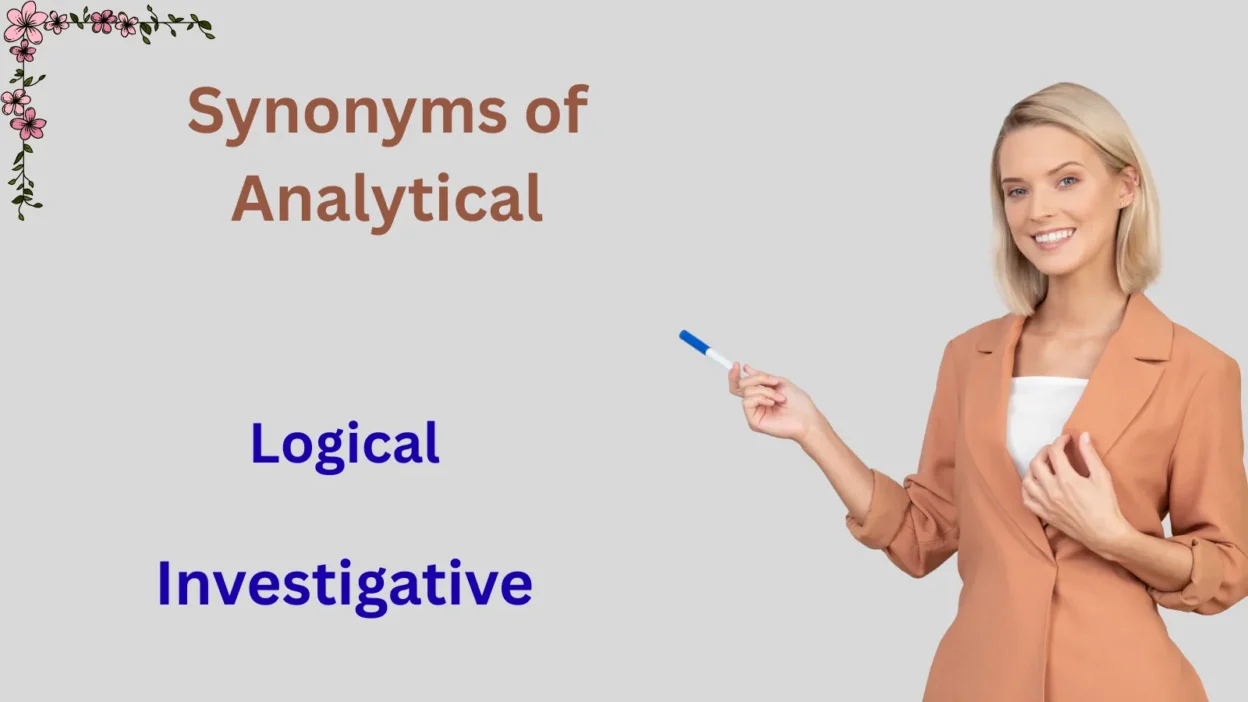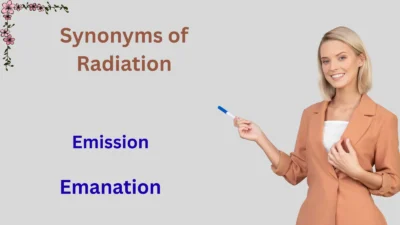Synonyms of analytical, like logical, methodical, critical, and systematic, describe the ability to think clearly, study details, and solve problems carefully. For example, “methodical” shows step-by-step thinking, while “critical” focuses on judging and evaluating information. These words help show different ways of thinking and analyzing.
If you write about reasoning, problem-solving, or science, using the right synonym for analytical makes your writing clear and precise.
These synonyms of analytical make your writing stronger and easier to understand. From schoolwork to everyday problems, the words for analysis show how people study, evaluate, and understand information.
What Does Analytical Mean?
Analytical means being able to study things carefully, find patterns, and understand details. It often shows:
- Logical and clear thinking
- Step-by-step or methodical reasoning
- Careful evaluation of details
- Systematic problem-solving
It’s not just thinking—it’s understanding deeply and solving problems with clarity. Think of analytical as a way to approach challenges with order and insight.
Synonyms & Related Words for Analytical (And When to Use Them)
1. Logical
Meaning: Based on clear reasoning.
Example: She logically approached the problem, breaking down each step systematically.
Usage: Ideal in academic, scientific, or technical contexts where reasoning is key.
2. Rational
Meaning: Guided by reason rather than emotion.
Example: His rational analysis helped the team avoid making impulsive decisions.
Usage: Works best when emphasizing objectivity or sensible decision-making.
3. Critical
Meaning: Involving careful judgment and evaluation.
Example: A critical review of the project revealed several areas for improvement.
Usage: Often used in academic or evaluative contexts, highlighting judgment rather than emotion.
4. Methodical
Meaning: Done according to a systematic plan.
Example: She followed a methodical approach to solve the complex puzzle.
Usage: Emphasizes structure and order, suitable in professional or scientific contexts.
5. Systematic
Meaning: Organized and consistent in approach.
Example: His systematic research ensured no detail was overlooked.
Usage: Best in research, engineering, and analytical work requiring thoroughness.
6. Reasoned
Meaning: Carefully thought out and logical.
Example: She presented a reasoned argument that convinced the board.
Usage: Suitable when emphasizing well-thought-out conclusions.
7. Investigative
Meaning: Seeking to discover facts or information.
Example: The journalist took an investigative approach to uncover the story.
Usage: Works well in journalism, research, or detective-like contexts.
8. Thoughtful
Meaning: Showing careful consideration.
Example: His thoughtful analysis impressed the management team.
Usage: Conveys both analytical skill and emotional intelligence, softer than “critical.”
9. Reflective
Meaning: Characterized by deep thinking or contemplation.
Example: The reflective essay explored the impact of social media on youth.
Usage: Often used in academic or literary contexts; emphasizes introspection.
10. Discerning
Meaning: Having keen insight or good judgment.
Example: Her discerning eye quickly identified the key flaws in the design.
Usage: Best when highlighting perceptiveness or expertise.
11. Evaluative
Meaning: Focused on assessing value or quality.
Example: The evaluative report rated each proposal according to specific criteria.
Usage: Useful in education, performance reviews, or research.
12. Diagnostic
Meaning: Designed to identify problems or causes.
Example: The doctor’s diagnostic skills helped uncover the rare illness.
Usage: Appropriate in medical, technical, or troubleshooting contexts.
13. Logical-Minded
Meaning: Naturally inclined to reason systematically.
Example: A logical-minded engineer solved the software bug efficiently.
Usage: Highlights inherent analytical tendencies, often positive in professional descriptions.
14. Calculated
Meaning: Done deliberately with careful planning.
Example: She took a calculated approach to negotiating the deal.
Usage: Often implies strategic thinking; can carry a slightly tactical or cautious tone.
15. Precise
Meaning: Exact and accurate in thought or expression.
Example: His precise analysis left no room for ambiguity.
Usage: Useful in scientific, technical, or detail-oriented contexts.
16. Rationalistic
Meaning: Emphasizing reason as the primary source of knowledge.
Example: His rationalistic approach ensured decisions were evidence-based.
Usage: Suitable for philosophical or intellectual discussions.
17. Intellectual
Meaning: Engaging in deep thinking and reasoning.
Example: The intellectual discussion challenged everyone to think critically.
Usage: Works well in academic, literary, or cultural contexts.
18. Objective
Meaning: Not influenced by personal feelings; impartial.
Example: The objective report presented all sides of the argument fairly.
Usage: Emphasizes neutrality; important in journalism, research, or mediation.
19. Investigatory
Meaning: Focused on investigation or inquiry.
Example: The investigatory committee examined every detail of the case.
Usage: Formal term for research or official inquiries.
20. Problem-Solving
Meaning: Skilled at identifying solutions to complex issues.
Example: Her problem-solving skills were critical to the project’s success.
Usage: Informal but widely used in professional contexts.
21. Conceptual
Meaning: Relating to abstract ideas or principles.
Example: His conceptual thinking helped design innovative strategies.
Usage: Often used in design, art, or strategic planning contexts.
22. Rational-Analytical
Meaning: Combining logic and careful analysis.
Example: A rational-analytical mind is essential for data-driven decisions.
Usage: Useful in technical or scientific discussions, emphasizing dual reasoning skills.
23. Prudent
Meaning: Careful and sensible in judgment.
Example: She took a prudent approach before investing in the new venture.
Usage: Highlights caution and foresight; more emotional tone than strict logic.
24. Observant
Meaning: Quick to notice details.
Example: His observant nature helped detect inconsistencies in the report.
Usage: Best when emphasizing attention to detail over abstract reasoning.
25. Systematized
Meaning: Arranged according to a coherent system.
Example: The systematized process improved efficiency across the department.
Usage: Suitable in technical, administrative, or operational contexts.
26. Technical
Meaning: Related to specialized knowledge or skills.
Example: Her technical analysis of the data revealed key trends.
Usage: Often used in STEM fields; emphasizes expertise rather than general reasoning.
27. Investigative-Minded
Meaning: Naturally inclined to inquire and examine.
Example: An investigative-minded reporter uncovers hidden facts quickly.
Usage: Highlights personality traits; less formal than “investigative.”
28. Inquisitive
Meaning: Curious and eager to learn or understand.
Example: His inquisitive nature made him a strong researcher.
Usage: Conveys curiosity alongside analytical skill; softer, more approachable tone.
29. Insightful
Meaning: Showing deep understanding or perception.
Example: Her insightful analysis shed light on overlooked issues.
Usage: Highlights interpretation and perception; slightly more emotional tone than “critical.”
30. Data-Driven
Meaning: Guided primarily by facts and quantitative evidence.
Example: The company adopted a data-driven strategy to optimize operations.
Usage: Common in business, marketing, and research; emphasizes evidence-based decisions.
How to Choose the Right Synonym
Picking the best synonym for “analytical” depends on emotion, tone, and context:
- Formal/Scientific: Logical, systematic, rational, technical
- Personal/Reflective: Thoughtful, perceptive, pensive, deliberate
- Business/Strategic: Strategic, calculated, data-driven, judicious
- Creative/Abstract: Interpretive, conceptual, insightful
- Curious/Mental agility: Inquisitive, investigative, discerning
Also, consider cultural nuances. In Western workplaces, being critical may be positive (constructive), but in casual conversation, it may sound negative. In contrast, perceptive or insightful people feel more emotionally aware and less blunt.
Conclusion:
Synonyms of analytical give you more ways to describe careful thinking and structured problem-solving. Words like methodical, systematic, and critical each highlight a different approach to understanding information or tackling challenges.
Choosing the right synonym lets you communicate ideas more precisely, whether in writing, discussions, or professional settings. These words help show the depth of thought, attention to detail, and clarity of reasoning behind decisions.
Ultimately, being analytical is about looking beneath the surface, noticing patterns, and making sense of complex information—and these synonyms help you express that process clearly.



